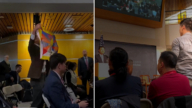【新唐人2013年05月29日訊】中共當局公布最新的兩部黨內法規,其中《黨內法規制定條例》,讓中共有權立法,這是中共首次擁有正式黨內「立法法」。條例一公布馬上引起評論界的關注。法律學者擔憂,以黨紀代替國法,讓黨高於國,未來要如何依法治國。
27號,中共中央公布《黨內法規制定條例》及《黨內法規和規範性文件備案規定》。
《黨內法規制定條例》對黨內法規的制定權限等作出了明確規定。而《備案規定》則對黨內法規和規範性文件備案的原則等,提出了具體要求。其中,中共《黨內法規制定條例》被稱為中共黨內的「立法法」。
對此,「杭州師範大學」教授,同時也是「中國法律史學會」的執行會長範忠信,在個人微博上表示,中共製定黨內法規「立法法」有待商榷,因黨只能有黨紀,而「法只能是國家的」。
按中共的「國家立法法」,只有全國人民代表大會和全國人民代表大會常務委員會,能行使國家立法權,而法規只有行政法規和地方性法規兩種,並沒有提及「黨內法規」。
網友說,「黨內法規」僅為黨內「文件」的形象說法,不應稱為法規。
大陸憲政學者陳永苗:「如果從法律上術語說,一個社團不應該是國家,他沒有立法的法權,他可能能制定一些對他們自己內部有約束力的黨紀、黨規這是沒問題的,但是他要立法這個就比較古怪了。」
陳永苗認為,共產黨對中國本身的破壞力和黨內腐敗程度,早已達到需要整治的時候,所謂黨內立法,可能是想通過法律技術層面,對中共幾千萬的共產黨員來進行約束,強化對政權的控制。
陳永苗:「沒有聽說一個政黨、一個社團是可以立法的。哪有一個政黨能立法的,那相當於這個政黨就是個國家,擁有國家法權。不要說習近平,就毛澤東,對當時的共產黨員,可能有一千萬或幾百萬都無可奈何,發動10年文革也沒搞好,黨內的內部整治是沒法救黨的。」
有評論分析,所謂黨內「立法法」該由誰制定,約束對像是誰,最後由誰來執行?這些都是須要確立的問題,因此,也可能產生另外一個利益共同體。
時事評論員李善鑒:「這個其實沒甚麼意義了,自己約束自己,這是個不可能的事情。這個黨很大程度上它不像一個正常社會的政黨,實質上更像一個黑幫,無論怎樣,只不過從原來的一個流氓的黑幫,標榜成現代化的黑幫,但是不管怎樣還是個黑幫。」
針對中國目前的政治制度,李善鑒認為,一個政黨凌駕於國家法律之上,則無法解決當前中國社會面臨的各種問題。
李善鑒:「中國現在問題就是法律本身不受尊重,無論它的政府機關,特別是凌駕國家之上的黨,根本不去尊重它,那麼自己給自己定了個法,就會尊重其他的法嗎?不會的。不會有任何變化,不會有任何影響。」
中國《河南商報》時事評論部主編王攀在微博上說,以後不叫「黨紀國法」,而叫「黨法國法」。王攀寫道﹕「乾脆8000萬人獨立成國得了。世界上不到8000萬人規模的國家多了去了。一個政黨可以有立法法,凌亂。我的疑問是,國法大、還是黨法大?衝突了,又是黨法領導國法嗎?」
採訪/田淨 編輯/黃億美 後製/郭敬
China’s Ruling Party Declares Its Legislative Law
The Chinese Communist Party (CCP) authorities
have announced two new laws.
One of them, an intra-Party law making ordinance,
gives the CCP legislative power.
It is the first CCP Legislative Law, this action has
immediately aroused concern from critics.
Legal scholars are worried that this legitimizes
the Party’s overriding of state laws.
They ask, how can it realize a governance that will
adhere to the rule of law in the future?
On May 27, the CCP Central Committee released
an “Ordinance on intra-Party lawmaking" and
“Rules on registration and the filing of intra-Party
laws and regulations, and standardized documents.”
The law-making ordinance makes clear that
the CCP has the power to make intra-Party laws.
The registration and filing rules put forward
specific requirements for the working principle.
The law-making ordinance is considered
the CCP’s internal Legislative Law.
Fan Zhongxin, executive director of the Chinese Legal
History Association, commented in his micro-blog.
He said that the establishment of Intra Party Legislation Law
remains open to question.
He argued that a political party only has power to establish
disciplines, whilst laws serve the country and it’s citizens.
According to China’s current Legislative Law, the
National People’s Congress and its Standing Committee can exercise legislative power.
The term “rules” contains administrative regulations
and local laws and regulations.
It does not cover “intra-Party laws and regulations”.
A netizen speculated that the intra-Party laws may
be a telling parlance of the CCP internal instructions.
They should not be called laws and regulations.
(China’s constitutional scholar) Chen Yongmiao: “Legally,
a social group is not a country, it has no legislative power.
It has rights to establish internal disciplines and rules.
But it’s really weird that it makes its own Legislative Law.”
Chen Yongmiao says, the CCP has long needed to be
rectified in the light of its destruction and corruption.
The alleged intra-Party Legislative Law may be the Party’s
technical attempts to restrict the actions of its members,
so as to cement its ruling status.
Chen Yongmiao: “It’s unprecedented that a political party
or a social group has right to make laws.
That means this political party is equivalent to
a country’s people, with legislative power.
Even Mao Zedong was helpless in rectifying
the CCP members in his era, let alone Xi Jinping.
Xi faces many more CCP members today than Mao did.
The CCP’s internal rectification cannot save itself.”
Some critics have said that the intra-Party Legislative Law
was supposed to specify the lawmaker, the target objects, and the executive role.
They think it may thus give rise to
another community of interest.
(Critic) Li Shanjian: “It actually makes no sense.
Self-restriction, for the CCP, is impossible.
The Party is largely unlike normal political parties,
it’s more like a sinister gang, in its nature,
although it is now, progressively, a much more
modern gang of rogues.”
Li Shanjian remarks that today in China,
a political party has openly trampled on state laws.
This makes it impossible to solve any existing social issues.
Li Shanjian: “The current problem in China is that
the ruling party shows no respect for the law.
In particular, the Party itself makes a law, can this
help to create more respect for state laws?
No, it cant. As for the possibility of reform,
there won’t be any changes or impact.”
Wang Pan, chief editor on current affairs, for China’s
Henan Business Daily, commented on his micro-blog.
Wang wrote, in the future, the term “Party discipline
and state laws” can be called “Party laws and state laws”.
“Once and for all, these 80 million people (CCP members)
have simply set up a separate nation within the nation.
A political party can makes a legislative law, what a mess!
My question is, which is superior, state laws or Party laws?
When both collide, will the result still be that
the Party’s law will take the lead?”




























